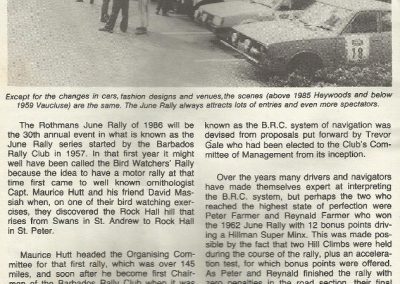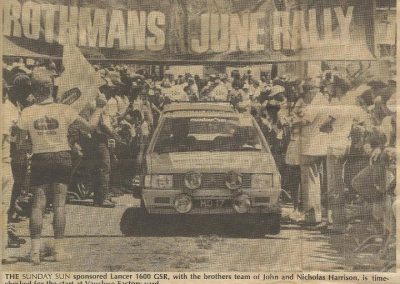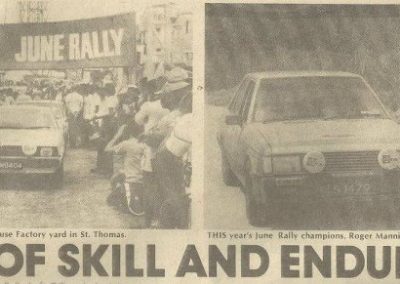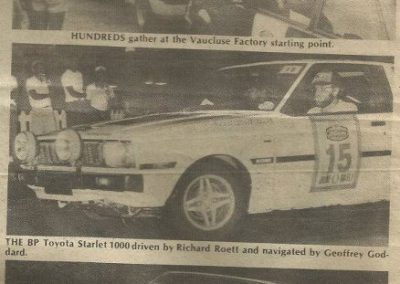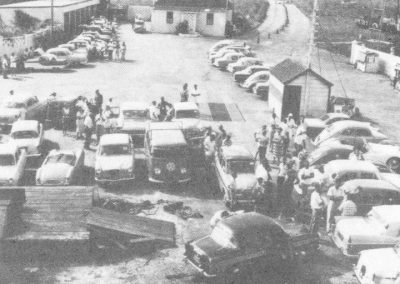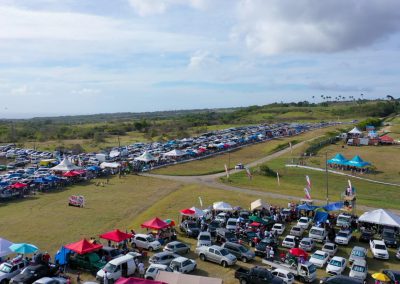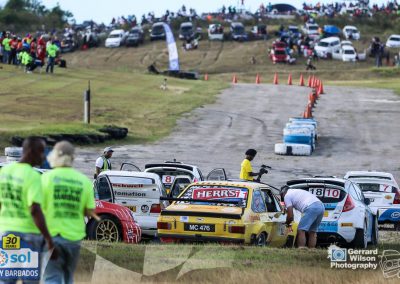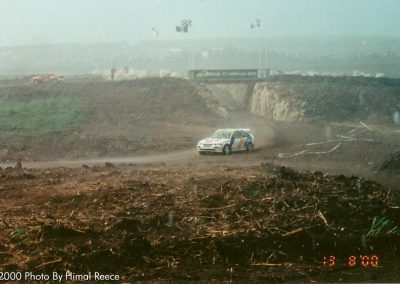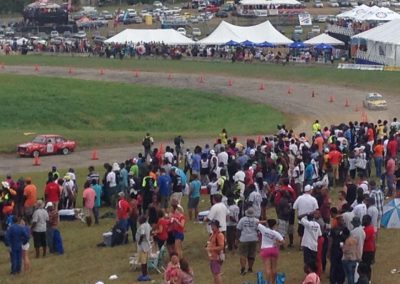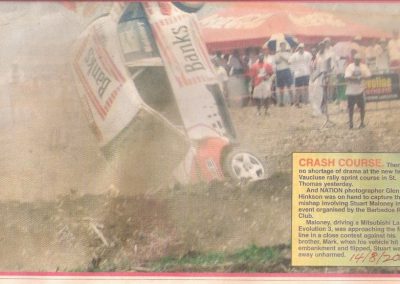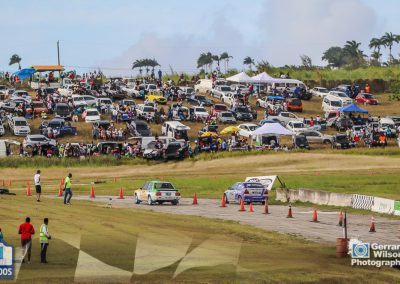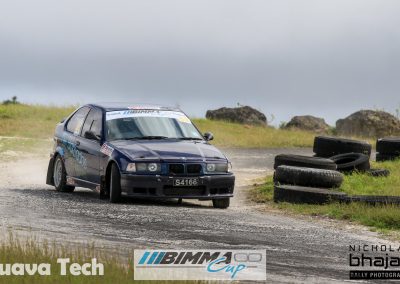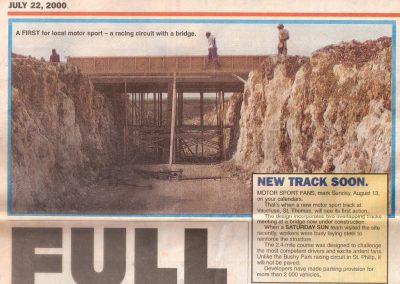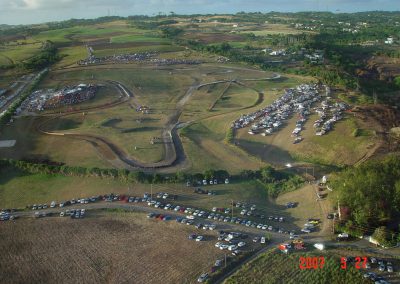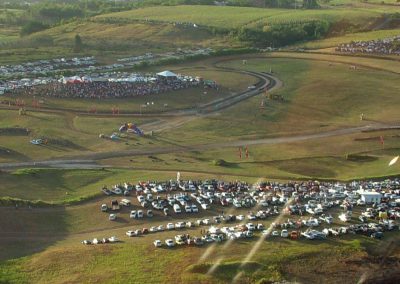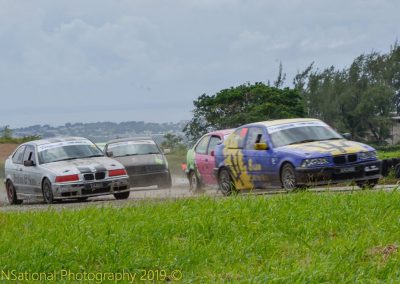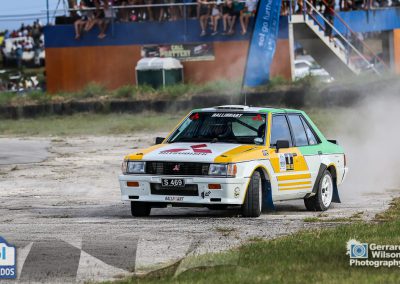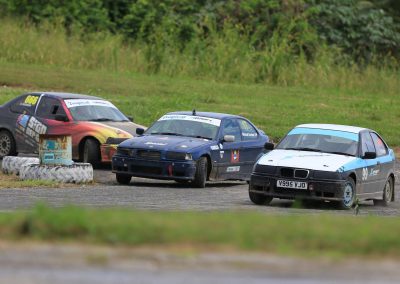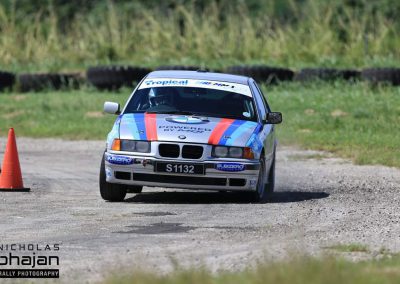History
May 26, 2020. This Dunkirk Evacuation Commemoration day seems a good time to explain a bit of the history of Caribbean, Barbados and Vaucluse Raceway motor sport.
Vaucluse Raceway is the product of a small group of diehard enthusiasts who built and run it, a large group of socially-motivated national and international competitors who love to compete there, tens of thousands of fans from around the world who have enjoyed its unique atmosphere as well as unique motor sport conditions and circumstances in Barbados and the wider Caribbean that made it possible.
To understand the history of Barbados and Caribbean motorsport we have to go back to WW2. The end of May 1940, after the fall of France and the British and French Armies’ evacuation from Dunkirk, was the darkest time in the history of Great Britain and her territories. The Battle of Britain had not yet started when the US ambassador in London advised President Roosevelt that Britain’s surrender was imminent.
Despite the 1937 Neutrality Act, the US could not afford to have its Caribbean neighbours fall to the Nazis and so made a deal with Churchill to exchange fifty obsolete WW1 destroyers for land leases to build military bases on Caribbean islands. This suited Churchill because he not only got the destroyers the Royal Navy so desperately needed but also surrendered the responsibility of defending the islands with limited resources.
The result was that the US built an airport and air station in Antigua (which is now the home to the Caribbean’s newest RallySprint circuit), an airport and seaplane base in Guyana, two airports and a seaplane base in Trinidad, an airport and air station in Jamaica and an airport in St. Lucia. Catalina flying boats could patrol for over eight hours, could rescue at sea and were re-engineered to carry anti-submarine torpedoes, depth charges and bombs. Liberators with their air-cooled radial engines could patrol and attack submarines at very low level.
British enthusiasts would understand the tremendous boost British motor sport got in the 50s and 60s from the closed WW2 airfields and the same occurred in the Caribbean. In fact, the first organised motor racing in the Caribbean started in Guyana with surplus US Air Force motorcycles. Hence circuit racing developed in Guyana, Trinidad and Jamaica, which had strong economies and comparatively large populations.
But there were no free airfields in Barbados, so our motorsport developed using the resources we had: a vast public and private road network facilitated by our relatively flat topography and created by a very successful sugar industry. The first motor regularity rally was held in Barbados in 1957. It started at Applewaites sugar factory and finished at Vaucluse sugar factory, both in the central parish of St. Thomas. This was followed soon after by several hillclimb events and then special stages were added to rallies.
In Barbados in 1971 there were circuit races held on dirt tracks at Chancery Lane and Bushy Park. Bushy Park was paved the following year and racing flourished before the circuit closed in 1975 due to the fuel crisis; Bajan drivers went rallying again. Even though circuit racing would be rekindled at Bushy Park in the 90s and then 2000s, the vast majority of serious Barbadian drivers remained rallyists at heart.
In 1995 the Caribbean Rally Championship was formed by rally clubs in Guadeloupe, Trinidad, Jamaica and led by Barbados. We adopted FIA regulations (which Guadeloupe always had as a French territory) which allowed Caribbean drivers to buy proper rally cars from Europe. The sport consequently boomed in the second half of the 90s and spectator numbers soared. In 1997, in a Six-roads rumshop after a Cars and Car Conversions post-Texaco Rally photo shoot at Bushy Park, Rally Reporter Martin Sharp commented: “The rallying here is OK but this craic is something special. You should turn it into a rally carnival!”.
So, in 1997 Greg Cozier and Spencer Hutchinson visited the Roger Clark RallySprint circuit at Silverstone on the invitation of Matt and Olly Clark, friends of Greg’s from college in UK. They were aware of Michelle Mouton’s Race of Champions circuit on Gran Canaria but went to see this form of ‘arena rallying’ at the Silverstone facility for themselves and experience the competition as passengers. They were convinced that Barbados needed a similar RallySprint circuit for driver entertainment as well as improved spectator access.
A few pints after the event with Tony Pond, Andy Dawson, the Clarks and a few other UK rally drivers, as well as rally press expert Martin Sharp, determined what features should be emulated and what improvements needed to be made. As soon as they returned to Barbados they submitted planning applications and started seeking partners and resources.
A 70-acre site at Vaucluse Plantation was chosen, along the Hangman Hill to Canefield special stage and 50m from the finishing point of Barbados’ first rally in 1957; the spiritual home of Bajan rallying. A course was laid out by following topography over newly-ploughed fields, followed by ground-breaking in July 2000. The first RallySprint event was organised by the Barbados Rally Club on August 13th, 2000 for all classes of rally cars, from humble production 1300s to full-Monty GroupA 4WD cars.
There were forty-six local competitors, three from St. Vincent and one from UK. Spectator turnout was greater than expected and they witnessed rally drivers and cars performing at a level of speed and commitment not possible on public roads and canefield tracks. The event was an overwhelming success.
At the beginning of 2001, the then Minister of Tourism The Hon. Noel Lynch was approached with a proposal for an entirely new methodology to turn Bajan motor sport into a tourist attraction. A case was made that, if it was no more expensive to travel to Barbados with a rally car than it was to travel here with golf clubs, motor sport in Barbados could be a self-sustaining tourism product.
It was agreed that the Barbados Government would pay the shipping costs for rally cars imported from UK if guests paid their travel costs and stayed for longer than ten nights in one of our three tourism off-peak periods; the end of May, end of August or end of November. Local event organisers chose the end of May for historical reasons and, with a RallySprint on the first weekend and a tarmac stage rally on the second, the Barbados Rally Carnival was born! Under Alan Tyndall’s RPM Productions direction, by its second year this event was reported to over nine million people in UK and Europe and continued growing annually.
The success of the Barbados Rally Carnival represented a turning point in Barbados motor sport history for two reasons:
Firstly, prior to this, every foreign competitor who ever came to Barbados since the 1970s did so at the expense of Barbadian clubs and sponsors to raise the profile of events. Conversely, Barbados Rally Carnival’s foreign competitors paid their own way at affordable prices made possible by the BTA shipping subsidy. The Barbados Rally Carnival was therefore the first motor sport tourism venture in Barbados.
Secondly, due to this fact, from hereon motor sport was recognised as a viable tourism income-earner by the Government of Barbados rather than just a pastime of the wealthy and a nuisance to road-users. This in turn created a motor sport national consciousness which led to consideration such as the Government Task Force on Motor Sport and all that stemmed from it like tax-free importation of motor sport cars and equipment.
This event truly changed peoples’ lives all around the world. Lifelong friends were made, guests married other guests (some twice), locals married guests, guests returned to Barbados numerous times for rallying and holidays and some bought property to spend more time here.
In 2006 the hugely successful Barbados Rally Carnival event format was replicated in the November tourism slow-period to create the Barbados RallyCross International, again with the financial support of the BTA. In 2010 the format was again replicated to create the Barbados Historic Rally Carnival which was also financially supported by Barbados Gov’t.
In 2015, during the peak of our economic crisis, a completely new motorsport formula for affordable BMW 318Ti Compacts called BimmaCup was introduced at Vaucluse Raceway. This has spread throughout the Caribbean and recently started in the United Kingdom. BimmaCup cars competing in Barbados in 2018 and 2019 have represented as much as 20% of total rally entries. The winners of BimmaCup Caribbean travel to UK to compete and vice versa.
Vaucluse Raceway is used for specific RallySprint and RallyCross events approximately six times per year and is used for rally stages and super-specials usually twice each year. Additionally it is used for Cropover and other social events several times per year.
Over the years the circuit has been improved by taking dust-mitigation measures, weather-proofing it with a stone aggregate, improving run-off areas and spectator access. A clubhouse was added for social events and after-racing parties in 2010. Later this year a RallyCross Junior Special short-circuit will be added, for competitors aged 10 to 16 years old, based on UK Autograss technical regulations. A seven-a-side football club should be joining us later this year as well.
For twenty years the caretakers of Vaucluse Raceway have proven over and over that they have their fingers on the World’s motorsport pulse. We know what amateur competitors want from their motor sport holiday trips and we have consistently been able to provide it.
We have invited motorsport tourists to our shores from over twenty different countries and we have flown the Barbados flag on international events by competing in United Kingdom, Ireland, Spain, Mallorca and several Caribbean islands.
RallyCross is the most exciting form of motorsport in the world, for drivers and spectators. Our plans for the future are simply to fine-tune the circuit and events we currently host while seeking new opportunities to introduce new as well as seasoned competitors to this wonderful sport.
BimmaCup has been an overwhelming success and we expect RallyCross Juniors to follow a similar pattern. Our next challenge will be to reduce costs for the owners of the scores of race and rally cars lying idle in the Caribbean so that they may be re-purposed as RallyCross cars to take part in international events. We hope to see you there!

